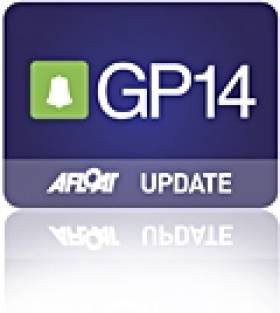Displaying items by tag: Craftinsure
CraftInsure Issue Top Tips to Help Avoid Storm Damage
‘Antoni’ and ‘Betty’ provided a sharp reminder that we are not immune to severe storm conditions even in mid-summer.
Craftinsure is helping a number of customers who have fallen victim to recent bad weather.
Claims have included a yacht capsizing on moorings, a Drascombe breaking adrift (sadly completely destroyed), smaller motorboats swamping and other boats suffering less serious damage from violent motion against piers and jetties even though well secured and heavily fendered.
Craft Insure has also received reports of dinghies being blown over despite being tied down and one yacht in a cradle ashore.
As we head towards autumn, here are our top tips to help avoid storm damage:
- If bad weather is forecast, try to get your boat ashore or to a more sheltered location if feasible; smaller boats, especially if fitted with heavy outboards, are particularly vulnerable to swamping and capsizing on moorings.
- Double up on mooring lines and springs.
- Check your boat regularly, adjusting lines and fenders as appropriate.
- Dinghies should be securely tied down to the ground (and not the trailer).
- Moorings should be checked at least annually; replace any suspect components and double up on strops.
- Yachts ashore should have boom covers and spray dodgers removed to reduce windage. Unstep masts at the end of the season.
- Make sure furling headsails are securely tied to prevent being blown out.
With a major insurer having withdrawn from the Irish boat insurance market last year and the new season now underway, some boat owners will need to find cover quickly.
Whilst in most cases you should be able to obtain an immediate quotation and cover online, there will be occasions where that isn’t possible for whatever reason. It may be that the boat is now due for a survey, perhaps or that the cruising area required falls outside the standard terms.
With these exceptional circumstances in mind, Craftinsure will try and help wherever possible. This may involve agreeing to waive a survey requirement for 12 months, for example, or providing a special extension to meet an unusual requirement included under a previous policy.
For those needing the most basic level of insurance, Craftinsure also offers a Third Party Only policy with annual premiums starting at €80.00 online.
If you need any help, email the Craftinsure team at [email protected] or call 01 282 4633 or www.craftinsure.ie
Craftinsure Launch New Irish Boat Insurance Website
#boatinsurance - Visitors to the Craftinsure.ie website will notice a big difference following a major upgrade which went live on 1st.
Apart from looking more up to date, the site, says Craftinsure's Rod Daniel is even easier to navigate and use.
It also includes a number of new features such as a Third Party Only insurance option, which should prove particularly attractive to those needing just the basic level of protection and to comply with any waterways regulations, with annual premiums starting at €75 and no survey requirement.
Apart from immediate quotations online, claim progress can be tracked and as previously, there is a monthly payment option at no extra cost where the annual premium would be over €100.
The website now also includes a new insurance option specifically for canoes and kayaks within the Small Boats category.
Craftinsure's Rod Daniel comments "we frequently receive feedback from customers to say they found our website very quick and easy to use and hope the new version will prove even more popular, though some might miss the water noises!"
Sponsor Boost for GP14s
#GP14 – Irish GP14 dinghy sailing gets a boost this season with the support of insurance firm Craftinsure for the class national championships The firm has also been selected to handle the GP14 Association insurance scheme with effect from 1st April 2012 following a review by the Association.
The insurance scheme for the GP14 Class Association is one of the longest established, having been in place for over 50 years, and is strongly supported. For much of it's history, the scheme was very successfully managed by long serving GP14 Association member Graham Knox, who still assists with liaison between the Association Committee and their insurance partners.
The new arrangement maintains the long association with Navigators & General (part of Zurich Insurance plc), as all Craftinsure polices are underwritten by N&G.
As a leading online boat insurer in Ireland and the UK, Craftinsure is able to provide a cost effective and convenient insurance facility for GP14 owners. The fact that claims staff along with other key members of the Craftinsure team, are active dinghy sailors was another important factor in the selection process, as was the level of cover and security provided.
The Association will continue to benefit from contributions for each GP14 insured through the scheme, as well as from other forms of support including sponsorship for the 2012 Irish Nationals and the 2012 World Championships
Rod Daniel, director of Craftinsure comments "we are delighted to have been appointed to handle the GP14 scheme and that this Association can be added to IODAI and others where we have a strong affiliation. We look forward to welcoming new and existing GP14 owners to Craftinsure and to supporting the Association as much as possible".
Craftinsure Sponsor Royal St. George Junior Event
Dun Laoghaire's Royal St. George Yacht Club has announced that its inaugural Junior Spring Open, sponsored by Craftinsure, will be held on the 19th & 20th of March 2011. This event promises to be a great kick start to the Junior Sailing Season for the Optimist, 420, Feva and Laser Classes.
There will be both Regatta and Main Fleets, Regatta Coaches on the courses and the event will count as an Optimist Pre-Trials and Pre-Regional event. With the ISA Mitsubishi Youth National Championship being held in the same sailing area at the end of April, this event is a great opportunity for sailors from all around the country to get some practise in the local waters.
There will be entertainment for sailors and parents on both evenings, evening dinners and, of course, full Six Nations Rugby coverage on the Saturday throughout the Club. There will also be live-tweeting from the water throughout the event - follow this live action unfold at www.twitter.com/rsgyc.
For further information and to enter online please visit www.rsgyc.ie. The Entrance Fee is €85 for Fevas & 420s and €55 for Oppies & Lasers.































































